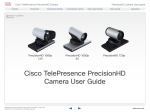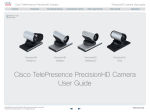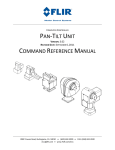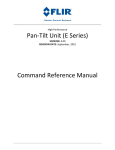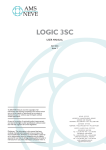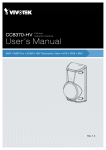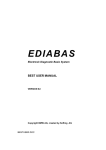Download Cisco PrecisionHD 1080p4x User guide
Transcript
What’s in this user guide? Getting started Connecting the camera Making your own cables Remote control Contact information User Guide TANDBERG PrecisionHD 1080p Camera Thank you for choosing TANDBERG! Your TANDBERG PrecisionHD 1080p Camera has been designed to give you many years of safe, reliable operation. This user guide has been divided into several chapters, all of which provide different information. You can access the chapters directly by clicking on the menu bar at the top of this page. You will find that some places information has been copied from other chapters (but adapted, when needed) to let you have all the relevant information there and then. This helps eliminating the need to read through long sections before you can even think of getting started. Our main objective with this user guide was to address your goals and needs. Please let us know how well we succeeded! www.tandberg.com D14245.04—DECEMBER 2008 1 PrecisionHD 1080p Camera What’s in this user guide? Getting started User Guide Connecting the camera Making your own cables Remote control Contact information Getting started The camera at a glance............................................................. 4 HDMI and HD-SDI..................................................................... 4 Cable lengths . .......................................................................... 4 Cascaded cameras.................................................................... 4 Best view (face recognition)....................................................... 5 Using Best View......................................................................... 5 Connecting the camera Connecting the camera............................................................. 7 DIP switch settings for video output formats............................. 8 Line voltage frequency............................................................... 8 Cameras in daisy chain.............................................................. 9 Cascaded cameras.................................................................... 9 Making your own cables Making your own cables.......................................................... 11 What’s in this user guide? D14245.04—DECEMBER 2008 INTELLECTUAL PROPERTY RIGHTS The TANDBERG PrecisionHD 1080p camera covered by this User Guide is protected under copyright, patent, and other intellectual property rights of various jurisdictions. Copyright © TANDBERG 2008. All rights reserved. This User Guide may be reproduced in its entirety, including all copyright and intellectual property notices, in limited quantities in connection with the use of the Product. Except for the limited exception set forth in the previous sentence, no part of this User Guide may be reproduced, stored in a retrieval system, or transmitted, in any form, or by any means, electronically, mechanically, by photocopying, or otherwise, without the prior written permission of TANDBERG. Requests for such permission should be addressed to [email protected]. Controlling cameras from remote Interfacing to the camera using the VISCA protocol................ 13 RS232 Parameters............................................................... 13 RS232 Commands and inquiries......................................... 13 VISCA messages..................................................................... 13 Message Format.................................................................. 13 Network and interface commands........................................... 14 Video mode selection.............................................................. 19 Method.................................................................................... 19 DIP Switch............................................................................... 19 DISCLAIMER The specifications for the Product and the information in this document are subject to change at any time, without notice, by TANDBERG. Every effort has been made to supply complete and accurate information in this User Guide. However, TANDBERG assumes no responsibility or liability for any errors or inaccuracies that may appear in this document. 2 PrecisionHD 1080p Camera What’s in this user guide? Getting started User Guide Connecting the camera Making your own cables Remote control Contact information Chapter 2 Getting started www.tandberg.com D14245.04—DECEMBER 2008 3 PrecisionHD 1080p Camera What’s in this user guide? Getting started User Guide Connecting the camera Making your own cables Remote control Contact information The camera at a glance Video out (HDMI, HD-SDI). For video signals, connect from the video out on the camera to the video in on the codec. Power and camera control. For power in and camera control, connect from the camera control & power on the camera to the Camera port on the codec. When the camera is used with TANDBERG codecs power will be supplied through Camera Control cable. When used with non-TANDBERG codecs, you may have to connect power separately. The orange LED illuminates whilst in a call and blinks whenever there is an incoming call. The lens hood is detachable. We recommend that you mount it to prevent stray light from disturbing your video experience. HDMI and HD-SDI Just snap it on gently. • HDMI is the main source for video out when connected to a codec. Maximum resolution is 1080p60. • HD-SDI is the secondary source for video. Maximum resolution is 1080p30 (maximum recommendable cable length is then 100 m). • The HDMI and HD-SDI can be used simultaneously. The maximum resolution is then 1080p30 if you want both to run with the same resolution. Cable lengths Maximum length of HDMI cable is 15 meter with a category 2 certified good quality HDMI cable. The green LED is continuously illuminated when power is On, but it flickers when receiving signals from the remote control. The maximum recommendable length of HD SDI cable is 100 m. Cascaded cameras HDMI and HD-SDI can be used simultaneously. The sockets named Extra Camera Out and Power In are used when connecting cameras in daisy chain. • The first camera in the chain is powered up by the camera control cable. The next cameras must use the 12V DC Power in. • The daisy chained cameras are connected by using an extra camera cable between the Extra Camera sockets. Power Supply Camera Control Extra Camera Out and for Daisy Chaining D14245.04—DECEMBER 2008 Not Used HDMI Video Out HD-SDI Out 4 PrecisionHD 1080p Camera What’s in this user guide? Getting started User Guide Connecting the camera Making your own cables Remote control Contact information Best view (face recognition) This camera is capable of face recognition when used with TANDBERG C90 Codecs. Observe that the feature is still a preview feature. Consequently, the functionality is subject to change without further notice in order to take advantage of further developments. The face recognition system aims to search for faces in order to optimize the picture frame, hence the name Best View. Once a face or group of faces has been detected camera zoom and camera angle will be changed accordingly to obtain an optimal presentation on the screen. Kindly observe the following: • The Best View optimization process may take up to 5 seconds. • The detection of faces works better when people look towards the camera. • The area from the eyebrows down to just below the lips should be uncovered. • Beard is normally not a problem. Using Best View Press the corresponding Soft key to engage the Best View feature. Note that Best View works with TANDBERG C90 Codecs only! 1. On the TRC5 remote control press the Home key to produce the main menu, if needed. 2. Navigate down to Settings, then press the Right arrow key produce the submenu and press again to produce the Layout submenu. 3. Select Selfview to be shown as required. 4. Press Home to collapse the menus 5. Navigate to Camera control and press the Right arrow key. The soft keys menu will now be displayed as shown to the right. 6. Press the corresponding key on the remote control to start the Best View function. The system will now look for human faces and adjust the zoom and camera angle to obtain a best fit. D14245.04—DECEMBER 2008 1 .@ 2 abc 4 ghi 5 jkl 7 pqrs def 3 mno 6 8 tuv wxyz 9 0 abc/123 # 5 PrecisionHD 1080p Camera What’s in this user guide? Getting started User Guide Connecting the camera Making your own cables Remote control Contact information Chapter 3 Connecting the camera www.tandberg.com D14245.04—DECEMBER 2008 6 PrecisionHD 1080p Camera What’s in this user guide? Getting started User Guide Connecting the camera Making your own cables Remote control Contact information Connecting the camera The HDMI and HD-SDI can be used simultaneously. HDMI cable The HDMI cable delivered with the camera is 5 meters. Maximum length is 15 meter with a category 2 certified good quality HDMI cable. HD-SDI cable The HD-SDI cable must be purchased separately. HDMI to DVI-D adapter HD-SDI socket The HDMI to DVI-D adapter is used when connecting to a TANDBERG MXP codec or TANDBERG Video Switch HDMI and HD-SDI can be used simultaneously. Power supply connection is NOT needed when the camera is used with a TANDBERG Codec. Camera Control. RJ45 to RS 232. Visca™ protocol is supported. Line in Connect HDMI HD Video out on camera to HDMI Main Camera In on the Codec. If you need to connect the camera to a TANDBERG Video Switch or to a system with a DVI-D socket, use the enclosed HDMI to DVI-D adapter. VISCA™ is a trademark of Sony Corporation D14245.04—DECEMBER 2008 7 PrecisionHD 1080p Camera What’s in this user guide? Getting started User Guide Connecting the camera Making your own cables Contact information Remote control Video output formats This section describes the video output formats for the TANDBERG PrecisionHD 1080p camera. DIP switch settings for video output formats The video output format for the camera is set by DIP switches. The DIP switches are found on the bottom side of the camera. DIP Switch table for video formats 1 0 1 2 3 4 5 0 0 0 0 0 0 0 0 0 1 1080p25 1080p25 0 0 0 1 0 1080p30 1080p30 0 0 0 1 1 1080p50 720p50 0 0 1 0 0 1080p60 720p60 Line voltage frequency 0 0 1 0 1 720p25 720p25 The camera will automatically detect the line voltage frequency when it is 50 or 60 Hz. You may set the video output format to a specific value (use the DIP switches) to override the auto frequency detection, if a different line voltage frequency is an issue. 0 0 1 1 0 720p30 720p30 0 0 1 1 1 720p50 720p50 0 1 0 0 0 720p60 720p60 0 1 0 0 1 The default setting is Auto. When using HDMI, the video output format is automatically detected. See the table to the right. Maximum resolution for HDMI is 1080p60. Maximum resolution for HD-SDI is 1080p30. Note that the camera must be switched off and on again to make the new DIP switch settings effective. The DIP switch HDMI HD-SDI Auto Software control The table shows the different settings available for the HDMI and the HD-SDI outputs. Auto: Camera negotiates format over HDMI. HD-SDI tracks HDMI and defaults to 1080p30 in absence of HDMI sync. Software: For more on the Software control setting, see Video mode selection. D14245.04—DECEMBER 2008 8 PrecisionHD 1080p Camera What’s in this user guide? Getting started User Guide Connecting the camera Making your own cables Contact information Remote control Cameras in daisy chain A single daisy chain can have up to seven cameras. Cascaded cameras The sockets named Extra Camera and Power In are used when connecting cameras in daisy chain. • HDMI and HD-SDI. The HDMI and HD-SDI can be used simultaneously on the same camera. • Power. The first camera in the chain is powered up from the codec by the VISCA camera control cable. Additional cameras must use the 12V DC Power in. • Extra camera cable. The daisy chained cameras are connected by using the VISCA Extra Camera cable between the Extra Camera In and Codec Control In sockets D14245.04—DECEMBER 2008 RJ11–RJ45 Connect to the Camera Control socket on the Codec. When used with TANDBERG Codecs, this first camera will need no power supply connected. 12 Vdc Connect to Video Input 1 on Codec. 12 Vdc RJ11–RJ45 Connect to Video Input 2 on Codec. RJ11–RJ45 12 Vdc Connect to Video Input 3 on Codec. Connect to Video Input 4 on Codec. 9 PrecisionHD 1080p Camera What’s in this user guide? Getting started User Guide Connecting the camera Making your own cables Remote control Contact information Chapter 4 Making your own cables www.tandberg.com D14245.04—DECEMBER 2008 10 PrecisionHD 1080p Camera What’s in this user guide? User Guide Getting started Making your own cables Connecting the camera Remote control Contact information Making your own cables If you need to assemble your own cables, the tables to the right show the pin-out required. Pin-out—TANDBERG camera cable RJ45 (8 pin) to D-SUB Signal name RJ45 pin D-SUB pin +12Vdc 1 GND 2 Twisted pair 4 RX 3 TX 6 NC 4 NC 5 GND 7 +12Vdc 8 Pin-out—VISCA Camera control RJ 45 8 pins shielded modular jack Pin Signal name 8 +12V (2.8mA current source when connected in daisy chain) 5 7 GND Twisted pair 2 6 TXD (out) 3 5 NC (no connect) Twisted pair 1 4 NC (no connect) 6 3 RXD (in) 5 2 GND 4 1 +12V Twisted pair Pin-out—VISCA Daisy chain Pin D14245.04—DECEMBER 2008 RJ 11 6 pins modular jack Signal name 6 GND 5 GND 4 RXD (in) 3 TXD (out) 2 Presence (12V in daisy chain) 1 GND 11 PrecisionHD 1080p Camera What’s in this user guide? Getting started User Guide Connecting the camera Making your own cables Remote control Contact information Chapter 5 Controlling cameras from remote www.tandberg.com D14245.04—DECEMBER 2008 12 PrecisionHD 1080p Camera What’s in this user guide? Getting started Interfacing to the camera using the VISCA protocol User Guide Connecting the camera Making your own cables Remote control Command and response exchange The RS232 Message format When the camera receives a command, it responds with either: The TANDBERG PrecisionHD 1080p camera uses an RS-232 control interface that resembles the Sony VISCA™ protocol. • Completion message: 90-5Y-FF Returned by camera when execution of commands and inquiries are completed. RS232 Parameters ... At startup, the communication parameters for the RS232 interface must be set to: • • • • • • 9600 bits per second 8 databits No parity 1 stopbit No hardware flow control No software flow control A list of all the available commands and inquiries together with the result and comments are found in the table on the following pages. • Error packets: 90-6Y-..-FF Returned by camera instead of a completion message when command or inquiry failed to be executed. General error messages, unless otherwise specified: • 90-6Y-01-FF Message length error (>14 bytes) • 90-6Y-02-FF Syntax error • 90-6Y-03-FF Command buffer full All parameters except speed are fixed and not user configurable. The speed may be changed by issuing the Speed command defined on the following pages. All control bytes are pure binary information, i.e. the control bytes are not ASCIIencoded. RS232 Commands and inquiries Contact information • 90-6Y-04-FF Command cancelled • 90-6Y-05-FF No socket (to be cancelled) • 90-6Y-41-FF Command not executable VISCA messages A particular command is recognized by the message information after the address byte. Message Format Commands are initiated from the host (i.e. the codec or any other external controller) to the camera. After a camera has been issued a command, the camera will generate a response. Commands and responses (messages) have the following format: • Address byte (1) • Information bytes (1..14) • Terminating byte (1) See the above illustration for details. The minimum length of any command or response is 3 bytes: 1. Address byte (1): Let us assume there is one host, i.e. the codec (the host is the unit controlling the camera). The host has address 0. The four least significant bits of the address byte contain the address of the receiver. In the case of a broadcast message, the receiver address should be set to 8. When we are operating a single camera, the address is 1. Hence, address bytes in messages from the host are 0x81, and messages from the camera to the host are 0x90 (the protocol allows for up to 7 cameras). 2. Message bytes (1..14): Any number of bytes containing the actual message information. Bytes may have any value in the range 0...254. The value 255 (i.e. hexadecimal FF) is reserved for the terminating byte. • Y = socket number A camera may contain two buffers so that two commands, including the command being executed, can be received. Note: The PrecisionHD 1080p camera supports a single socket only. Consequently, the Y always assumes the value Y = 0. There are exceptions to these rules: • An Initialize message will respond as indicated in the Table of Commands (this message is in fact a broadcast message, and any unit other than the host receiving the broadcast message must pass it on). • Do not route commands or replies that are longer than 16 bytes through Sony cameras. The easiest way to avoid this is to put the TANDBERG cameras first in the chain. Commands and replies that are longer than 16 bytes are clearly marked below. 3. Terminating byte (1): All messages must be terminated with a byte containing all 1’s, i.e. decimal 255 (or hexadecimal FF). D14245.04—DECEMBER 2008 13 PrecisionHD 1080p Camera What’s in this user guide? Getting started User Guide Connecting the camera Network and interface commands Remote control Making your own cables Contact information Push messages Messages sent from camera to controller. Command Set Command Packet Comments Command Set Command Packet Reply and Comments IF_Clear 8x 01 00 01 ff Clear command buffer. Stop any current operation in progress. Does not do much on Rover. Network_Change y0 38 ff This indicates that cameras have been added to or removed from the chain. Address_Set 8x 30 0p ff p = address for this device. If x=8 (broadcast), increase p with 1 before sending to chain. Command_Cancel 8x 2p ff p = Socket ID. Rover does not support multiple sockets. Commands will always run to completion. Don’t use it It is recommended to wait 9 seconds after receiving this message before doing a full reconfigure. IR_Push y0 07 7d 02 gg hh ff If IR mode is on, IR codes received by the camera will be sent to the controller. gg = IR ID hh = keycode BestView_Done_Push y0 0a 61 0p 0q ff First push message sent after BestView is done. . pq = Number of frames detected. The camera will generate pq Res_Push messages after this message. BestView_Res_Push y0 0a 62 0p 0q [tiltpos] [panpos] [tiltSize] [panSize] [yPos] [xPos] [yDim] [xDim] [trackDur] [quality] [speech] ff pq = Face number, should be less than or equal to pq given in Done_Push. Parameters specified in brackets are unsigned 16 bit quantities, defined as “0p 0q 0r 0s”. [tiltpos] and [panpos] are 16 bit signed. Make sure this message is not routed through Sony cameras. D14245.04—DECEMBER 2008 14 PrecisionHD 1080p Camera What’s in this user guide? Getting started User Guide Connecting the camera Making your own cables Remote control Contact information Camera commands Command Command Packet Comments Power_On 8x 01 04 00 02 ff Power_Off 8x 01 04 00 03 ff Power control. This command stores the zoom and focus value and reset these motors. Used for Tiger if the camera was on for a long time. Video_Format WB_Auto 8x 01 35 0p 0q 0r ff 8x 01 04 35 00 FF Selects video format. p = reserved. q = video mode. r = See the chapter about the DIP switch settings WB: White Balance WB_Table_Manual 8x 01 04 35 06 ff WB_Table_Direct 8x 01 04 75 0p 0q 0r 0s ff Used if WBmode = Table manual pqrs = wb table. AE_Auto 8x 01 04 39 00 FF AE: Automatic Exposure. AE_Manual 8x 01 04 39 03 FF Iris_Direct 8x 01 04 4B 0p 0q 0r 0s FF Used if AE mode = Manual. pqrs: Iris position, range 0..50 Gain_Direct 8x 01 04 4c 0p 0q 0r 0s FF Used if AE mode = Manual. pqrs: Gain position, values:1221dB. Backlight_On 8x 01 04 33 02 FF BacklightCompensation mode Backlight_Off 8x 01 04 33 03 FF Mirror_On 8x 01 04 61 02 ff Mirror_Off 8x 01 04 61 03 ff Flip_On 8x 01 04 66 02 ff Flip_Off 8x 01 04 66 03 ff Command Packet Comments Refers to orange LED on top of camera. Will always be off at startup. Call_LED_On 8x 01 33 01 01 ff Call_LED_Off 8x 01 33 01 00 ff Call_LED_Blink 8x 01 33 01 02 ff Power_LED_On 8x 01 33 02 01 ff Power_LED_Off 8x 01 33 02 00 ff IR_Output_On 8x 01 06 08 02 ff IR_Output_Off 8x 01 06 08 03 ff IR_CameraControl_On 8x 01 06 09 02 ff IR_CameraControl_Off 8x 01 06 09 03 ff BestView_On 8x 01 50 60 0p 0q ff BestView_Stop 8x 01 50 60 00 00 ff Green power LED. If switched to off and stored to startup profile, it will always be off. See IR push message. Lets up/down/left/right/ zoom+/- on the IR remote control the camera directly. Those keycodes will be sent to the controller if IR Output is on. Turn BestView on or off. pq=time (in seconds) Will generate push message(s) as specified above when the time runs out. Sony calls this CAM_LR_ Reverse. RR (FT/AT mirror command) Sony calls this CAM_ImgFlip. Gamma_Auto 8x 01 04 51 02 ff Gamma_Manual 8x 01 04 51 03 ff Gamma_Direct 8x 01 04 52 0p 0q 0r 0s ff pqrs: Gamma table to use in manual mode. Range 0-7. MM_Detect_On 8x 01 50 30 01 ff Turn on the Motor Moved Detection (camera recalibrates if touched) MM_Detect_Off 8x 01 50 30 00 ff Turn off the Motor Moved Detection (camera does not recalibrate if touched) D14245.04—DECEMBER 2008 Command Gamma mode. Default uses gamma table 4. 15 PrecisionHD 1080p Camera What’s in this user guide? Getting started User Guide Connecting the camera Making your own cables Remote control Contact information PTZF - movement commands Command Command Packet Comments Zoom_Stop 8x 01 04 07 00 ff Zoom_Tele 8x 01 04 07 2p ff Zoom_Wide 8x 01 04 07 3p ff Zoom_Direct 8x 01 04 47 0p 0q 0r 0s ff pqrs: zoom position ZoomFocus_Direct 8x 01 04 47 0p 0q 0r pqrs: zoom position 0s tuvw: focus position Command Command Packet Comments PT_Direct 8x 01 06 02 0p 0t 0q 0r 0s 0u 0v 0w 0x 0y FF p: max pan speed t: max tilt speed qrsu: pan position vwxy: tilt position p = speed parameter, a (low) to b (high) Attempts to linearize movement. PTZF_Direct 8x 01 06 20 0p 0q 0r 0s 0t 0u 0v 0w 0x 0y 0z 0g 0h 0i 0j 0k ff pqrs: pan tuvw: tilt xyzg: zoom hijk: focus 0t 0u 0v 0w ff Focus_Stop 8x 01 04 08 00 ff Focus_Far 8x 01 04 08 2p ff Focus_Near 8x 01 04 08 3p ff Focus_Direct 8x 01 04 48 0p 0q 0r 0s ff pqrs: focus position Focus_Auto 8x 01 04 38 02 ff Autofocus mode on/off. p = speed parameter, a (low) to b (high) NOTE: If mode is auto, camera may disable autofocus when focus is ok. Autofocus will be turned back on when camera is moved using Zoom_Tele/ Wide, PT_Up/Down/Left/Right. Ditto for IR_CameraControl movement. Never route this message through Sony cameras. Attempts to linearize movement for pan and tilt PT_Limit_Set 8x 01 06 07 00 0x 0p 0q 0r 0s 0t 0u 0v 0w ff x=1: Up/Right x=0: Down/Left pqrs: Pan limit tuvx: Tilt limit. This command is valid only to next boot. PT_Limit_Clear 8x 01 06 07 01 0x [...] ff x=1: Up/Right x=0: Down/Left Sony specifies lots of filler bytes after 0x. Ignore them. Focus_Manual 8x 01 04 38 03 ff PT_Stop 8x 01 06 01 03 03 03 03 ff PT_Reset 8x 01 06 05 ff Reset pan/tilt to center positition. Will also resynchronize motors. PT_Up 8x 01 06 01 0p 0t 03 01 ff PT_Down 8x 01 06 01 0p 0t 03 02 ff p pan speed t: tilt speed PT_Left 8x 01 06 01 0p 0t 01 03 ff PT_Right 8x 01 06 01 0p 0t 02 03 ff PT_UpLeft 8x 01 06 01 0p 0t 01 01 ff PT_UpRight 8x 01 06 01 0p 0t 02 01 ff PT_DownLeft 8x 01 06 01 0p 0t 01 02 ff PT_DownRight 8x 01 06 01 0p 0t 02 02 ff D14245.04—DECEMBER 2008 Sets all motors in one operation. Right -> increment pan Left -> decrement pan Up -> increment tilt Down -> decrement tilt 16 PrecisionHD 1080p Camera What’s in this user guide? Getting started User Guide Connecting the camera Making your own cables Remote control Contact information Inquiries Command Command Packet Response Command Command Packet Response CAM_ID_Inq 8x 09 04 22 ff Resp: 90 50 zz xx 00 yy ff Only zz, which identifies the camera, is relevant. zz = 0x50 for this camera. Gamma_Table_Inq 8x 09 04 52 ff Resp: y0 50 0p 0q 0r 0s ff pqrs: Gamma table in use if manual mode. Call_LED_Inq 8x 09 01 33 01 ff CAM_SWID_Inq 8x 09 04 23 ff Resp: y0 50 [1-125 bytes ASCII SWID] ff. Never route this message through Sony cameras. Resp: y0 50 0p ff p=2: On, p=3: Off, p=4: Blink Power_LED_Inq 8x 09 01 33 02 ff Resp: y0 50 0p ff p=2: On, p=3: Off Video_System_Inq 8x 09 06 23 ff y0 50 0p 0q 0r 0s ff pqrs=video mode currently being output on the HDMI port. See chapter on DIP switches. DIP_Switch_Inq 8x 09 06 24 ff y0 50 0p 0q 0r 0s ff pqrs contains the bit pattern of the DIP switch. See chapter on DIP switches. IR_Output_Inq 8x 09 06 08 ff Resp: y0 50 0p ff p=2: On, p=3: Off ALS_RGain_Inq 8x 09 50 50 ff Ambient Light Sensor Resp: y0 50 0p 0q 0r 0s 0t 0u 0v 0w ff CAM_HWID_Inq 8x 09 04 24 ff The response is the Module Serial Number stored in EEPROM. The number is converted to ASCII : y0 50 [12 bytes ASCII HWID] ff. Zoom_Pos_Inq 8x 09 04 47 ff Resp: y0 50 0p 0q 0r 0s ff pqrs: zoom position Focus_Pos_Inq 8x 09 04 48 ff Resp: y0 50 0p 0q 0r 0s ff pqrs: focus position Focus_Mode_Inq 8x 09 04 38 ff Resp: y0 50 0p ff p=2: Auto, p=3: Manual PanTilt_Pos_Inq 8x 09 06 12 ff Resp: y0 50 0p 0q 0r 0s 0t 0u 0v 0w ff pqrs: pan position tuvw: tilt position pqrstuv=32 bit unsigned integer, relative gain value. The integration time is a constant set in the camera SW. Power_Inq 8x 09 04 00 ff Resp: y0 50 0p ff p=2: On, p=3: Off ALS_BGain_Inq 8x 09 50 51 ff WB_Mode_Inq 8x 09 04 35 ff Resp: y0 50 0p ff p=0: Auto , p=6: Table manual ALS_GGain_Inq 8x 09 50 52 ff WB_Table_Inq 8x 09 04 75 ff Resp: y0 50 0p 0q 0r 0s ff pqrs: Table used if table mode ALS_WGain_Inq 8x 09 50 53 ff BestView_Inq 8x 09 50 60 ff AE_Mode_Inq 8x 09 04 39 ff Resp: y0 50 0p ff p=0: Auto, p=3: Manual Backlight_Mode_Inq 8x 09 04 33 ff Resp: y0 50 0p ff p=2: On, p=3: Off Resp: y0 50 0p 0q 0r 0s ff pq=0: BestView not running. pq>0: BestView running, time specified when started rs: Time spent so far Up side down_Inq 8x 09 50 70 ff Mirror_Inq 8x 09 04 61 ff Resp: y0 50 0p ff p=2: On, p=3: Off Resp: y0 50 0p ff p=0: Camera is upright. p=1: Camera is upside down. Flip_Inq 8x 09 04 66 ff Is video flipped or not? Resp: y0 50 0p ff p=2: On , p=3: Off Gamma_Mode_Inq 8x 09 04 51 ff Resp: y0 50 0p ff p=2: Auto, p=3: Manual D14245.04—DECEMBER 2008 17 PrecisionHD 1080p Camera What’s in this user guide? Getting started User Guide Connecting the camera Remote control Making your own cables Contact information Software upload commands Debug commands The CRC algorithm used is the same as in the XModem protocol. CRC for last data packet is only calculated for the actual data bytes in the packet. Pad last packet with 0x00 so that the data section is 256 bytes long. Never route these messages through Sony cameras. They are provided for Rover debugging only, and do not conform to the Visca length requirements. The PacketID counter starts at 0. Command Command Packet Comments Command Command Packet Comments SW start 8x 01 50 a2 0p 0q 0r 0s 0t 0u 0v 0w ff pqrstuvw = size, pq=LSB Returns y050ff if ok. CAM_PingPong_Reset 8x ae ff Reset ping ctr to 0. CAM_Ping 8x af 0p 0q 0r 0s [256 bytes data] ff pqrs = Pingval. Camera will respond with OK if correct pingval received. Increase ctr with 1 for next packet. Data section will be dumped to stdout if it fails. CAM_Stdin 8x a4 [0-256 bytes stdin] 00 ff Send command to the command interpreter. CAM_Debug_Mode 8x 01 39 0q ff q=0: Debug mode off. Fatal errors: Returns y06006ff if upload already in progress. Returns y06007ff if unable to access the flash. SW end 8x 01 50 a1 ff Sent after last SW packet, instructs camera to verify new application. Command may take up to 30 seconds to complete. q=1: Debug mode on. Camera will send stdout as visca messages in the following format: Returns y050ff if ok. Issue a camera reboot to activate new software. Returns y06008ff if verification of sw failed. SW abort 8x 01 50 a3 ff Abort sw upload in progress SW packet 8x a0 pp qq rr ss [256 bytes data] ppqq = 16 bit packet id, pp=LSB rrss = 16 bit CRC, rr=LSB y0 50 [0-256 bytes stdout] 00 ff Other commands Command Command Packet Comments Returns y0 50 ff if packet ok. -> send next one. CAM_Boot 8x 01 42 ff Reboot the camera. This will also reset serial speed to 9600. Returns y0 60 09 ff if crc error -> retransmit packet. CAM_Speed 8x 01 34 0p ff p=0: Serial speed 9600. p=1: Serial speed 115200. Reply will be sent before the speed switch takes place. Please wait 20ms after ok before sending new commands. Returns y0 60 0a ff if id error -> retransmit packet Fatal errors: y0 60 0b ff not in upload mode y0 60 0c ff error writing data to flash NOTE: Entire message after 8x a0... is raw data, so it may contain 0xff. Header is kept as short as possible. Never route this message through Sony cameras. D14245.04—DECEMBER 2008 18 PrecisionHD 1080p Camera What’s in this user guide? Getting started User Guide Connecting the camera Contact information Remote control Making your own cables Video mode selection Method The DIP switch selection has priority over the selection made by the CAM_Video_Format command. If the DIP switch is set to auto, the CAM_Video_Format setting will be used. If both are set to auto, resolution will be controlled automatically by EDID. DIP Switch Switches are numbered 1 to 5. The VISCA column shows the value that should be used when using the CAM_Video_Format command. The DIP switches are only read by the SW at startup/boot. So if the DIP switches are changed the camera must be rebooted. If an undefined mode is selected, the output will default to auto. 1 2 3 4 5 Visca HDMI 0 0 0 0 0 x Auto* HD-SDI 0 0 0 0 1 0x0000 1080p25 1080p25 0 0 0 1 0 0x0001 1080p30 1080p30 0 0 0 1 1 0x0002 1080p50 720p50 0 0 1 0 0 0x0003 1080p60 720p60 0 0 1 0 1 0x0004 720p25 720p25 0 0 1 1 0 0x0005 720p30 720p30 0 0 1 1 1 0x0006 720p50 720p50 0 1 0 0 0 0x0007 720p60 720p60 0 1 0 0 1 0x0009 SW control * Camera negotiates format over HDMI, HD-SDI tracks HDMI, and defaults to 1080p30 in absence of HDMI sync. 1 0 The DIP switch D14245.04—DECEMBER 2008 19 PrecisionHD 1080p Camera What’s in this user guide? Getting started User Guide Connecting the camera U.S. HEADQUARTERS TANDBERG 1212 Avenue of the Americas 24th Floor New York, NY 10036 Telephone: +1 212 692 6500 Fax: +1 212 692 6501 Video: +1 212 692 6535 E-mail: [email protected] Making your own cables Remote control Contact information EUROPEAN HEADQUARTERS TANDBERG Philip Pedersens vei 20 1366 Lysaker Norway Telephone: +47 67 125 125 Fax: +47 67 125 234 Video: +47 67 126 126 E-mail: [email protected] Copyright © TANDBERG 2008. All rights reserved. This document contains information that is proprietary to TANDBERG. No part of this publication may be reproduced, stored in a retrieval system, or transmitted, in any form, or by any means, electronically, mechanically, by photocopying, or otherwise, without the prior written permission of TANDBERG. Nationally and internationally recognized trademarks and trade names are the property of their respective holders and are hereby acknowledged. D14245.04—DECEMBER 2008 20




















